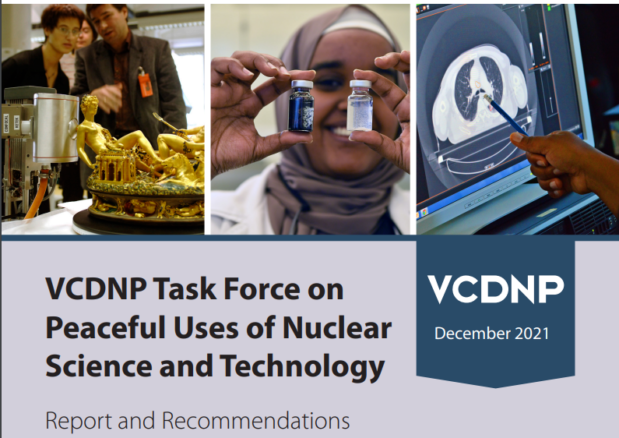On 15 December 2021, the VCDNP held the virtual launch of the report and recommendations of its Task Force on peaceful uses of nuclear science and technology. The event featured opening remarks from Ambassador Gustavo Zlauvinen, President-Designate of the Tenth Review Conference of the Treaty on the Non-Proliferation of Nuclear Weapons (NPT), Dr. Najat Mokhtar, Deputy Director General and Head of the Department of Nuclear Sciences and Applications of the International Atomic Energy Agency (IAEA) and Ambassador (ret.) Alfredo Labbe, Chair of the Task Force. VCDNP Executive Director Elena K. Sokova presented the recommendations and VCDNP Senior Research Associate Ingrid Kirsten moderated the event.
Ms. Kirsten in her opening remarks noted that the Task Force of high-level experts considered the challenges and the opportunities to expanding peaceful uses to address global development challenges while maintaining non-proliferation and nuclear security objectives. The launch of the Task Force report and recommendations marks the conclusion of this work.
To frame these recommendations for the upcoming NPT Review Conference, the VCDNP was honoured to have Ambassador Zlauvinen give opening remarks. Ambassador Zlauvinen highlighted that the peaceful application of nuclear science and technology will play an important role in the upcoming Review Conference. He added that the NPT, as a platform to promote the benefits of peaceful uses, could further advance their importance on the global stage, and highlighted specific approaches that NPT States Parties can take in facilitating such advancement.
Dr. Mokhtar, in her remarks, reflected on the unique role of nuclear science and applications in addressing global development challenges and provided several concrete examples of their impact. She described the IAEA’s key role in transferring nuclear technology and related techniques to States, building capacity, providing technical expertise, and enhancing infrastructure. Dr. Mokhtar emphasized the need to invest in and promote research and development activities, and to develop and adapt technologies to meet the needs, conditions and capacities of the countries concerned.
Ambassador Labbe called on states to affirm the contribution of nuclear energy and its peaceful applications to development and climate goals. He emphasized the importance of the Task Force’s recommendation to convene a high-level event organized jointly by UN Secretary--General António Guterres and IAEA Director General Rafael Mariano Grossi on nuclear technology and applications to raise the profile of peaceful uses in UN agencies, development organizations, Member States, and with the public.
Following opening remarks, Ms. Sokova presented the Task Force’s report and recommendations. She noted that the majority of the Task Force recommendations are focused on the IAEA, Member States, and industry. A separate set of recommendations addressed action items for NPT States Parties. Ms. Sokova explained that peaceful nuclear applications could be wider utilized in addressing UN Sustainable Development Goals, specifically in health, climate-smart agriculture, industrial development and environmental monitoring. The Task Force identified key constraints as limited resources, lack of awareness of the benefits of peaceful uses, and lack of capacity and access to technology. To overcome these impediments, the Task Force offered a broad set of recommendations grouped by four key themes:
- Awareness-raising: Improve communication on the benefits of peaceful uses vertically, horizontally and with civil society.
- Expanded and improved partnerships: engage a wide variety of partners, including new and non-traditional partners.
- Safety, security and safeguards: 3Ss are integral for sustainable application of nuclear science and technology and should support and facilitate access to peaceful uses for all and strengthen public confidence.
- Sustainability and access to technology: Add sustainability as a 4th “S” to improve the capacity and ensure that peaceful uses and nuclear technology are cost effective, accessible and user-friendly, particularly to developing countries and least developed countries.
Ms. Sokova noted that among the most critical recommendations for the upcoming NPT Review Conference are the need to affirm the linkages between peaceful uses and the UN Sustainable Development Goals. Furthermore States Parties should provide specific commitments for support and pledges toward cooperation in peaceful uses and increased access to them for developing countries, particularly least developed countries. She also emphasized the Task Force recommendation to NPT States Parties and IAEA Member States to call for a high-level conference on peaceful uses to be convened by the UN Secretary-General and IAEA Director General.
The recording of the event can be found below.

